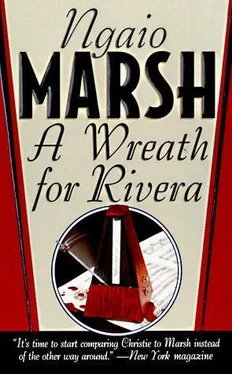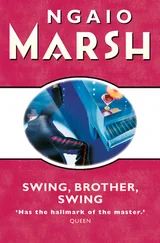“Naturally. In Rivera at all events.”
“I don’t know what servants’ gossip you have been listening to, Inspector Alleyn.”
“Miss Henderson, I’ve heard enough from Miss de Suze herself to tell me that there was an understanding between them.”
“I watched those two men,” she said exactly as if he hadn’t spoken. “And I saw at once there was bad blood between them. They looked at each other — I can’t describe it — with enmity. They were both, of course, incredibly common and blatant. They scarcely spoke to each other but during dinner, over and over again, I saw the other one, the conductor, eyeing him. He talked a great deal to Félicité and to Lord Pastern but he listened to…”
“To Rivera?” Alleyn prompted. She seemed to be incapable of pronouncing his name.
“Yes. He listened to him as if he resented every word he spoke. That would have been natural enough from any of us.” ‘
“Was Rivera so offensive?”
An expression of eagerness appeared on her face. Here was something, at last, about which she was ready to speak.
“Offensive?” she said. “He was beyond everything. He sat next to Carlisle and even she was nonplussed. Evidently she attracted him. It was perfectly revolting.”
Alleyn thought distastefully: “Now what’s behind all this? Resentment? At Carlisle rather than Félicité attracting the atrocious Rivera? Or righteous indignation? Or what?”
She had raised her head. Her arm still rested on the mantelpiece and she had stretched out her hand to a framed photograph of Félicité in presentation dress. He moved slightly and saw that her eyes were fixed on the photograph. Félicité’s eyes, under her triple plumage, stared back with the glazed distaste (so suggestive of the unwitting influence of Mr. John Gielgud) that characterizes the modish photograph. Miss Henderson began to speak again and it was as if she addressed herself to the photograph. “Of course, Félicité didn’t mind in the least. It was nothing to her. A relief, no doubt. Anything rather than suffer his odious attentions. But it was clear to me that the other creature and he had quarrelled. It was quite obvious.”
“But if they hardly spoke to each other how could…?”
“I’ve told you. It was the way the other person, Bellairs, looked at him. He watched him perpetually.”
Alleyn now stood before her. They made a formal conversation piece with the length of the mantelpiece between them. He said: “Miss Henderson, who was beside you at the dinner table?”
“I sat next to Lord Pastern. On his left.”
“And on your left?”
She made a fastidious movement with her shoulders. “Mr. Bellairs.”
“Do you remember what he talked to you about?”
Her mouth twisted. “I don’t remember that he spoke to me at all,” she said. “He had evidently realized that I was a person of no importance. He devoted himself to Félicité, who was on his other side. He gave me his shoulder.”
Her voice faded out almost before she had uttered the last word as if, too late, she had tried to stop herself.
“If he gave you his shoulder,” Alleyn said, “how did it come about that you could see this inimical fixed stare of his?”
The photograph of Félicité crashed on the hearth. Miss Henderson cried out and knelt. “How clumsy of me,” she whispered.
“Let me do it. You may cut your fingers.”
“No,” she said sharply, “don’t touch it.”
She began to pick the slivers of glass from the frame and drop them in the grate. “There’s a looking-glass on the wall of the dining-room,” she said. “I could see him in that.” And in a flat voice that had lost all its urgency she repeated: “He watched him perpetually.”
“Yes,” Alleyn said, “I remember the looking-glass. I accept that.”
“Thank you,” she said ironically.
“One more question. Did you go into the ballroom at any time after dinner?”
She looked up at him warily and after a moment said: “I believe I did. Yes. I did.”
“When?”
“Félicité had lost her cigarette case. It was when they were changing and she called out from her room. She had been in the ballroom during the afternoon and thought she might have left it there.”
“Had she done so?”
“Yes. It was on the piano. Under some music.”
“What else was on the piano?”
“A bundle of parasols.”
“Anything else?”
“No,” she said. “Nothing.”
“Or on the chairs or floor?”
“Nothing.”
“Are you sure?”
“Perfectly sure,” she said and dropped a piece of glass with a little tinkle in the grate.
“Well,” Alleyn said, “if I can’t help you, perhaps I’d better take myself off.”
She seemed to examine the photograph. She peered at it as if to make certain there were no flaws or scratches on Félicité’s image. “Very well,” she said and stood up, holding the face of the photograph against her flattish chest. “I’m sorry if I haven’t told you the kind of things you want to be told. The truth is so seldom what one really wants to hear, is it? But perhaps you don’t think I have told you the truth.”
“I think I am nearer to it than I was before I visited you.”
He left her, with the broken photograph still pressed against the bosom of her dark suit. On the landing he encountered Hortense. Her ladyship, Hortense said, smiling knowledgeably at him, would be glad to see him before he left. She was in her boudoir.
It was a small, delicately appointed room on the same floor. Lady Pastern rose from her desk, a pretty Empire affair, as he came in. She was firmly encased in her morning dress. Her hair was rigid, her hands ringed. A thin film of make-up had been carefully spread over the folds and shadows of her face. She looked ghastly but completely in order.
“It is so good of you to spare me a moment,” she said and held out her hand. This was unexepected. Evidently she considered that her change of manner required an explanation and, without wasting time, let him have it.
“I did not realize last night,” she said concisely, “that you must be the younger son of an old friend of my father’s. You are Sir George Alleyn’s son, are you not?”
Alleyn bowed. This, he thought, is going to be tiresome.
“Your father,” she said, “was a frequent visitor at my parents’ house in the Faubourg St.-Germain. He was, in those days, an attaché, I think, at your embassy in Paris.” Her voice faded and an extraordinary look came over her face. He was unable to interpret it.
“What is it, Lady Pastern?” he asked.
“Nothing. I was reminded, for a moment, of a former conversation. We were speaking of your father. I remember that he and your mother called upon one occasion, bringing their two boys with them. Perhaps you do not recollect the visit.”
“It is extremely kind of you to do so.”
“I had understood that you were to be entered in the British Diplomatic Service.”
“I was entirely unsuited for it, I’m afraid.”
“Of course,” she said with a sort of creaking graciousness, “young men after the first war began to find their vocation in unconventional fields. One understands and accepts these changes, doesn’t one?”
“Since I am here as a policeman,” Alleyn said politely, “I hope so.”
Lady Pastern examined him with that complete lack of reticence which is often the characteristic of royal personages. It occurred to him that she herself would also have shaped up well, in an intimidating way, as a policewoman.
“It is a relief to me,” she announced, after a pause, “that we are in your hands. You will appreciate my difficulties. It will make an enormous difference.”
Alleyn was familiar enough with this point of view, and detested it.
Читать дальше






